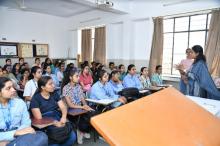Waste Management and Composting

IIS (Deemed to be University), Jaipur
Discipline of Botany
Waste Management and Composting
Speaker: Dr. Kanika Jindal, Assistant Professor, IIHMR University, Jaipur
Date: 28 February 2023
No. of students: 65
To marked the National Science Day, the Discipline of Botany, IIS (Deemed to be University), organized a guest lecture cum demonstration on “Waste Management and Composting” on February 28, 2023 for undergraduate and postgraduate students of botany. The resource person for the same was Dr. Kanika Jindal, Assistant Professor, IIHMR University, Jaipur.
She emphasised the significance of waste management and also generated and awareness regarding management of kitchen waste through composting. She demonstrated composting by using normal kitchen waste including vegetable and fruit peel, leaf litter, curd to name a few. She explained the importance of segregating the wet and the dry waste and how it can be done at ground levels so that it is easier for the Municipal authorities to recycle the dry waste as well as compost the wet waste respectively.
She demonstrated that the entire process of composting can be easily done at home. According to her, a clay or pot preferably with wider mouth is the easiest option that can be used as a container to carry out the process of composting. There should be a balance in the carbon and nitrogen content of the waste that is to be composted. Too much nitrogen content might lead the waste to be more wet and soggy than usual. Hence, adequate number of dried leaves can be added as a solution to increase the amount of carbon content. She showed how various stages of compost actually looks like.
This was an interactive session wherein the students inquired about the impact of weather and temperature on composting, Dr. Jindal told that in summers, the process of composting is the fastest as temperature is optimum for the microbes to work. At the same time, during the monsoon and rainy season this process tends to get slower due to high moisture content and a relative drop in the temperature. However, in the winters this rate of the process is the minimum and it takes a lot of time to compost than usual. This helped creating an awareness amongst students and faculty for managing their household waste and also learning the art of composting.

